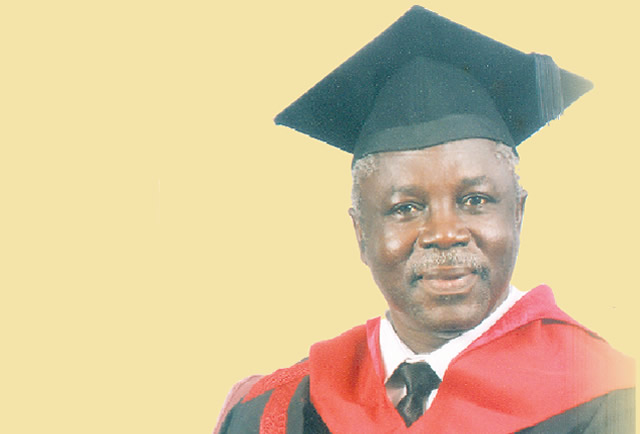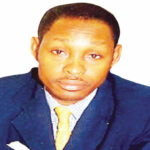
Where does one begin this kind of lachrymal elegy? Obviously, one is in considerable sadness over the passing of this communication colossus, Prof. Olayiwola Muraino Oso, popularly known as “Lai Oso” who died on Saturday June 24, 2023 in a motor accident on his way back to Lagos from Abraka, Delta State, where he had gone to examine a doctoral dissertation.
Prof. Oso was at various times a lecturer of mass communication in different higher institutions where he had opportunities of training many students, a majority of whom are professional communicators today. For instance, he was a rave of the moment at the Ogun State Polytechnic (now Moshood Abiola Polytechnic), Abeokuta, Mass Communication department for many years before he went to the Ogun State University, Ago Iwoye and later to the Lagos State University.
Until his death, he was the President, Association of Communication Scholars and Professionals of Nigeria. He had his first degree at the University of Lagos, Obafemi Awolowo University, Ile-Ife, Osun State (M.Sc. International Relations) and obtained a PhD in Mass Communication as a Federal Government scholar at the University of Leicester, England in 1977.
He worked as a reporter both in radio and the News Agency of Nigeria. He taught courses at both undergraduate and postgraduate levels in journalism, media and governance, political communication, development communication and theory and also has many publications in the area.
Although there is nothing so special about dying, for it’s a quotidian occurrence. This particular death, however, came with certain indefinable pains. Prof. Oso’s death is so sudden, so shocking, so sobering and so sad to the extent that it robs the nation the profundity of his knowledge that would have continued to be instrumental in its development. His death is heart-breaking and mind-blowing.
Prof. Oso’s demise is devastating. It is more or less like a fall of an iroko tree in the forest which does not only reverberate across the length and breadth of the forest, but leaves a huge vacuum that will be difficult to fill. Prof. Oso who was a celebrated scholar of uncommon standing, was a one-man study in intellectual integrity, pleasing balance thought dynamism and wordsmithery.
He was a pundit, provocateur, penman and a prosodist with a sustaining power to weave discursive parables that could amuse, anger, enlighten, challenge and entertain. He was one lecturer whose connection between thought and wordplay is absolute. In those days at Ogun Poly, he was a wonder to watch in the classroom. He would come to the classroom without any note, yet reel out different communication theories. He dazzled us so much that we nicknamed him “Oso Oba theories” (Oso, the king of theories).
Indeed, his prodigious and monumental contributions to communication scholarship have now guaranteed him certain immortality. No one could tell where his influence has reached. The beauty of his intellectual constructs will forever be adored. The fond memory of his scholastic oeuvre will remain a solace.
As mass communicators, Oso taught us to be dialogical, conversational, expressional and communicational in a simple, but artistic manner. He made us know that a communicator must be discursive. He was vivacious, warm and a highly infectious humourist. Clearly, he was an encyclopaedia of anecdotes and analogies. His stylistic armoury provided sheer delight in language and logic, phonetics and ideasational resources. Evaluating his epistemological and pedagogical methodologies, one will come off with an impression that he was a genius who mastered his discipline so well. In delivery, he was student-centred.
He was our editorial adviser when I was the editor of the departmental training newspaper called, “Poly Echo.” He taught us to deepen our knowledge by reading extensively to produce rigorous, velvety prose of robust intellection and libertarian nirvana. He detested clumsiness, graceless wordplay, sloppy prose, intellectual timidity, clodden metaphors and lifeless wonkery. Indeed, he was acknowledged for his great humility in spite of his daunting intellectual exploits and achievements.
Now, sadly though, a castle of knowledge is closed. A huge library of communication has been shut down. Unfortunately, his death has robbed us of the pleasure of enjoying the mature kolanut. The storm has uprooted the iroko tree in bloom! Death in a rather speedy riddance, has taken him away from us. Let the pigeon hear and tell the partridge, and let the river hear and tell the road that Prof. Oso died on the road while teaching communication.
It’s sad that my mentor and encourager is now written about in the past tense. I am utterly devastated by his demise. Tears welled in many eyes, just as wails and sorrowful sighs poured forth from the mouths of many who benefitted from his well of wisdom. This is a tragedy of immense proportions.
However, there is a dimension of this death that should be interrogated: the state of Nigerian roads. It is stating the obvious to say that most Nigerian roads are roads to ruins. Many Nigerian highways are death traps. In February 2014, three professors at the Ahmadu Bello University, Zaria, Kaduna State, died in an auto crash. The academics; Prof. Samuel Kafewo, Dr. Martins Ayegba and Nanaaisha Ali, perished on Nigerian road in Kaduna while going for a conference. I also recall that one of my favourite writers, Festus Iyayi, died on the road in a ghastly motor accident while plying his trade of knowledge sharing. Is this not another opportunity to call on the government to do the needful about the condition of Nigerian roads? Must we be losing our eggheads who sacrifice so much but get so little to accident on our bad roads?
Prof. Oso’s death came when the University of Ibadan community has yet to recover from the killing of Prof. Opeyemi Ajewole who was murdered recently by yet-to-be identified assailants. When a professor dies, a lot of investment is destroyed. It took so much to produce a professor. The amount of knowledge that is wasted is unquantifiable. The country is robbed of their intellectual resources. The students are denied the privilege of learning from cultivated minds. Unfortunately, professors are not easy to replace.
For Prof. Oso, I reluctantly say goodnight much earlier than I had hoped. Better than a thousand days of diligent study is one day with a great scholar like you. You shall be sorely missed. Each time you saw my article in newspapers, you would call me and praise my efforts. Now that luxury of hearing your voice is gone. You taught me at Ogun poly, you examined my thesis at the University of Ibadan. Now, you have left me! I am so sad and inconsolable! Rest on, “Oso, Oba Theories.”
• Sunday Saanu is with the University of Ibadan, Oyo State





